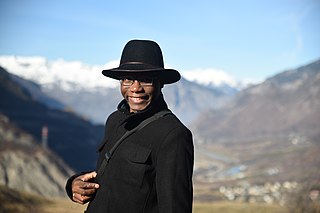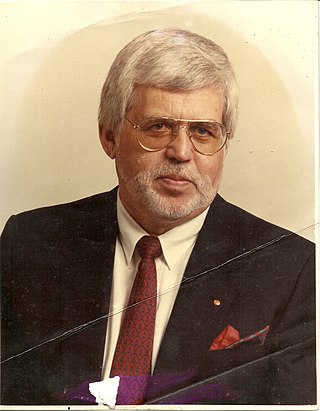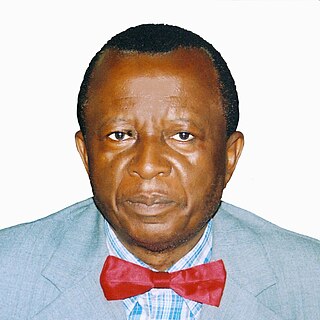Related Research Articles

Kinshasa, formerly named Léopoldville before June 30, 1966, is the capital and largest city of the Democratic Republic of the Congo. Once a site of fishing and trading villages along the Congo River, Kinshasa is now one of the world's fastest-growing megacities. With an estimated population of 16 million residents, it's the most densely populated city in the DRC and the most populous city in Africa. It is Africa's third-largest metropolitan area and the leading economic, political, and cultural center of the DRC. Kinshasa houses several industries, including manufacturing, telecommunications, banking, and entertainment. The city also hosts some of DRC's significant institutional buildings, such as the Palais du Peuple, Palais de la Nation, Court of Cassation, Constitutional Court, Cité de l'Union Africaine, Palais de Marbre, Stade des Martyrs, Immeuble du Gouvernement, Kinshasa Financial Center, and multiple federal departments and agencies.

Cheikh Anta Diop was a Senegalese historian, anthropologist, physicist, and politician who studied the human race's origins and pre-colonial African culture. Diop's work is considered foundational to the theory of Afrocentricity, though he himself never described himself as an Afrocentrist. The questions he posed about cultural bias in scientific research contributed greatly to the postcolonial turn in the study of African civilizations.
Clémentine Faïk-Nzuji Madiya, is a Congolese poet and writer. She was born in Tshofa, Kabinda District in the Belgian Congo. Albert S. Gérard calls her "the first poet of real significance" among a group of African writers who emerged in the late 1960s; she was also the first female writer in the Belgian Congo.

Joseph-Achille Mbembe, known as Achille Mbembe, is a Cameroonian historian, political theorist, and public intellectual who is a research professor in history and politics at the Wits Institute for Social and Economy Research at the University of the Witwatersrand. He is well known for his writings on colonialism and its consequences and is a leading figure in new wave French critical theory.

Lovanium University was a Catholic Jesuit university in Kinshasa in the Belgian Congo. The university was established in 1954 on the Kimwenza plateau, near Kinshasa. The university continued to function after independence until it was merged into the National University of Zaire in 1971. It can be considered an antecedent of the University of Kinshasa.

Jean-Marc Ela was a Cameroonian sociologist and theologian. Working variously as a diocesan priest and a professor, Ela was the author of many books on theology, philosophy, and social sciences in Africa. His most famous work, African Cry has been called the "soundest illustration" of the spirit of liberation theology in sub-Saharan Africa. His works are widely cited as exemplary of sub-Saharan African Christian theology for their focus on contextualisation and their emphasis on community-centered approaches to theology.

Présence Africaine is a pan-African quarterly cultural, political, and literary magazine, published in Paris, France, and founded by Alioune Diop in 1947. In 1949, Présence Africaine expanded to include a publishing house and a bookstore on rue des Écoles in the Latin Quarter of Paris. The journal was highly influential in the Pan-Africanist movement, the decolonisation struggle of former French colonies, and the birth of the Négritude movement.

Buata Bundu Malela is a specialist in comparative literature and historian of the intellectuals of the Afro-West-Indian diaspora. He was born in Kinshasa, Zaire in 1979 to Congolese and Senegalese parents.
Daniel P. Biebuyck was a Belgian scholar of Central African art.

Patrice Yengo is a francophone Congolese political anthropologist living and teaching in Paris, France. He is a specialist of the Congolese Civil War (1993–2002), otherwise known as the Republic of the Congo Civil War. He is originally from Pointe-Noire, Republic of the Congo (Congo-Brazzaville).
Pius Ngandu Nkashama was a professor, writer, playwright, poet and literary critic. He was born September 4, 1946 in Mbujimayi in the province of Kasai Oriental in the Democratic Republic of the Congo. He died on December 19, 2023 in Baton-Rouge, Louisiana, US.

Alf Schwarz was a Canadian sociologist noted for his research in Sub-Saharan Africa. After studies at the Sorbonne (Paris) with Raymond Aron, Pierre Bourdieu, Claude Lévi-Strauss, Roger Bastide, Georges Balandier and research assignment at Université de Dakar (Senegal), he began his academic career in 1963 with a faculty position at the Institut de recherches économiques et sociales of Université Lovanium. He joined in 1966 Université Laval as professor of sociology. He founded at Laval University the first academic program in African studies in French speaking Canada. As one of the pioneers of African studies in Canada he was decidedly involved in the creation of the Canadian Association of African Studies and edited for many years the Canadian Journal of African Studies/La Revue Canadienne des Études Africaines. He retired from Laval University in 1998. He died in Natal, Brazil in 2015.

Marcel Antoine Lihau or Ebua Libana la Molengo Lihau was a Congolese jurist, law professor and politician who served as the inaugural First President of the Supreme Court of Justice of the Congo from 1968 until 1975, and was involved in the creation of two constitutions for the Democratic Republic of the Congo.

Constantin Kasongo Munganga is a politician and monetarist from the Democratic Republic of Congo. He holds a Ph.D. in economics. In 2011, he was elected MP for the constituency of Katanda Territory, in the Kasai-Oriental province. He is the former Chief Executive Officer of the Center for Expertise, Evaluation, and Certification of Precious and Semi-Precious Mineral Substances, CEEC in short. Television audiences nicknamed him "The Man With The Red Knot" because of his appearance on media. Since 1975, he has taught at the Institut Supérieur de Commerce of Kinshasa.
For the British footballer, see Dominic Thomas.
Isidore Ndaywel è Nziem, is a Congolese historian and linguist. He is the author of several essays, studies and other publications about the history of the Congo, including the overview work L'histoire générale du Congo: De l'héritage ancien à la République démocratique.

Jean-Pierre Makouta-Mboukou was a Congolese politician, academic, novelist and playwright. For his abundant and eclectic work his biographers have called him the “Congolese Victor Hugo” and the “baobab of Congolese literature”.
Godefroid Mana Kangudie, known by his pen name Kä Mana, was a Congolese writer, professor, and theologian. He was one of the most famous philosophers in the Democratic Republic of Congo and served as President of the POLE Institute.
Bogumil (Bogumił) Jewsiewicki Koss is a Polish-Canadian historian and an Africanist specialising in the history of Central Africa, notably the Democratic Republic of the Congo, and the social usage of visual memory.
Martin A. Klein is an Africanist and an emeritus professor in the History Department at the University of Toronto specialising in the Atlantic slave trade, and francophone West Africa: Senegal, Guinea, and Mali. He obtained a Bachelor of Arts degree in journalism at Northwestern University (1951-1955) and a Master of Arts and Doctor of Philosophy in history at the University of Chicago (1957-1964). Klein worked as an assistant professor at the University of California Berkeley from 1965 till 1970, later teaching African history at the University of Toronto as an associate professor and later full professor from 1970 until his retirement in 1999. As a Fulbright Fellow, Klein taught for a year at Lovanium University in Kinshasa.
References
- ↑ Orrells, Daniel (1 March 2016). "V.Y. Mudimbe and the Myth of Oedipus". The East African Review (51): 45–59. doi: 10.4000/eastafrica.316 . ISSN 2071-7245. S2CID 171888569.
- ↑ Mudimbe, V. Y.; Mudimbé, Vumbi Yoka (1991). UW Press – : Parables and Fables: Exegesis, Textuality, and Politics in Central Africa, V. Y. Mudimbe. ISBN 978-0-299-13064-0.
- ↑ "Valentin Mudimbe | Program in Literature". literature.duke.edu. Retrieved 20 March 2021.
- ↑ Masolo, D. A. (1991). "An Archaeology of African Knowledge: A Discussion of V. Y. Mudimbe". Callaloo. 14 (4): 998–1011. doi:10.2307/2931218. JSTOR 2931218 – via JSTOR.
- ↑ Mazrui, Ali AlʼAmin (2005). "The Re-invention of Africa: Edward Said, V. Y. Mudimbe, and Beyond". Research in African Literatures. 36 (3): 68–82. doi:10.2979/RAL.2005.36.3.68. S2CID 162245529 – via Project MUSE.
- ↑ Archie, Marlene M. "An Afrocentric Critique of Mudimbe's Book The Invention of Africa" (PDF). African Studies– via Institute of African Studies.